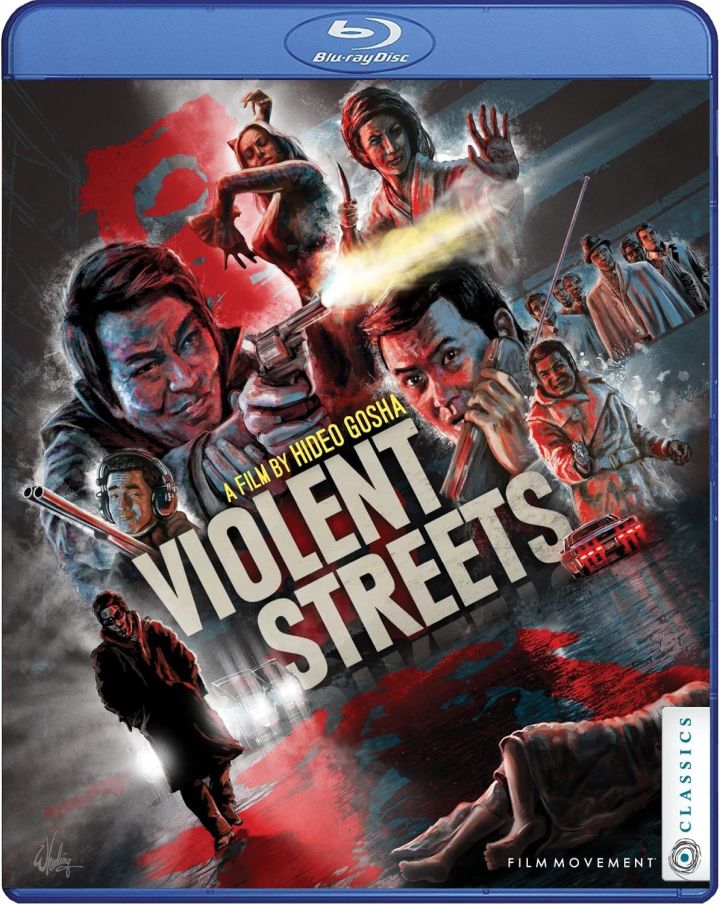
It might be a form of survivorship bias, but movies “demystifying” or “deglamorizing” yakuza seem to outnumber any other kind of yakuza movie 10 to 1, at least that we receive in the West. Most yakuza movies we get are about one good apple in a spoiled bunch. Or a solitary honorable man in a pit of vipers, either too cowardly or too nasty to be anything but pawns or butchers. The message is that none of the others were living up to the supposed code of the yakuza.
The ’70s brought a different kind of revisionism, starting with Fukasaku’s Battles Without Honor or Humanity series, which argued the entire system was a hypocrisy. There was no code, no honor, just old men using the vitality of the young to procure resources. Hideo Gosha’s Violent Streets, from 1974, followed in that series’ wake and makes its own impression as a hyper-violent rejection of the supposed yakuza code of honor.
Noboru Ando, a former yakuza turned actor, stars as Egawa. He’s a retired family head, who has been given a Spanish-themed bar as a retirement present by his former clan. The only problem is that the clan has gone legitimate, and they regard it as an embarrassment and liability to have a former gangster associate running a club in their area. They try to buy him out and remind him they have the legal title to the property and could kick him out if they wanted. Egawa resists, and there’s a standoff… until one of the clan’s major legit assets, a TV star and singer, is kidnapped. At first, they believe it’s an Osaka gang muscling in. But after a payoff result in the return of the singer’s corpse, the bosses begin to suspect Egawa has reformed his family and is getting revenge.
He hasn’t… but it’s not for his former men’s lack of trying. They did, in fact, kidnap the girl, accidentally kill her, and hide the money on Egawa’s property. So, he is pulled back into a gang war he does everything to avoid. Which is too bad for everyone else since he’s the most dangerous fellow around. If he wasn’t, he wouldn’t be the protagonist of a yakuza movie.
Violent Streets is filled with criminal characters who are distasteful in various ways. Egawa’s old gang, after a surprisingly successful kidnapping, are bumblers. The singer dies after one of them accidentally chokes her to death while trying to ravish her. The old yakuza have become a bunch of corporate cowards who want to use the old yakuza ways, just not have to hear about it in the press.
The only sympathetic characters are Egawa and his old friend Yazaki. Yazaki is the one who comes around trying to strong arm Egawa into giving up his bar, but he’s also the only member of the clan who understands that they’re still a nasty little gang, even if they pretend to be a corporation.
Egawa is the protagonist, but the movie oddly doesn’t focus on him too much, as it follows the various movements of the power brokers. There’s the kidnapping, the money drop off. Once the gang is found out, there’s a lengthy sequence where a pair of weird assassins uncover and murder the gang members one by one. When Egawa is finally goaded into action, he contacts a gun runner played by Bunta Sugawara. Bunta was a mainstay of Kinji Fukasaku’s ’70s yakuza movies, including the Battles Without Honor and Humanity and the New Battles Without Honor and Humanity. His part is brief, but memorable, and it’s a little like the character from the other movie wants to check in and see the yakuza are still getting a good dressing down.
Hideo Gosha’s movies have always been violent, and it should be no surprise that a movie called Violent Streets would be bloody as all get out. There’s shoot outs, razor blade slashings, beatings with golf clubs. In one long, extremely bloody sequence I think someone’s face is blown off by a shotgun. The special effects are primitive, but the blood does gush.
Violent Streets does the double duty of satisfying a genre fan’s prurient interest and a film fan’s formal interest. There’s blood, there’s sex and nudity. And it fulfills the cineastes’ thirst for interesting compositions and framing, and subtext. Egawa’s club, Madrid, has flamenco dancers and a Spanish guitarist, perhaps signaling his outside status from the very Japanese yakuza he has abandoned. But when he confronts the yakuza leadership at their own club, they’ve got a white stripper dancing to rock music. And the ending has a decent twist, solidifying that the corporatizing of the yakuza in no way indemnifies them from evil.
Violent Streets is a violent ramshackle of a film. It’s no artsy character study, and it works purely as a crime exploitation film. But it also has an abundance of character in the filmmaking and storytelling. There’s the core story of betrayal, between Egawa and his former yakuza brothers and in a greater sense of the yakuza and their supposed code. And there’s cross-dressing assassin, kidnapped television singers, cars driving through storefronts and shootouts around chicken coops (where it looks like some actual chickens get shot. Sorry, guys.) It’s a poignant story about betrayed trust and a wild yakuza action film all at once.
Violent Streets has been released by Film Movement Classics. There are two video featurettes: “Tattooed Director: Hideo Gosha” (20 min) with the director’s daughter, Tomoe Gosha, and “A Street That Can’t Be Beat” (9 min), a video essay by TokyoScope author Patrick Macias. There’s also an essay in the booklet by Japanese film expert Mark Schilling.